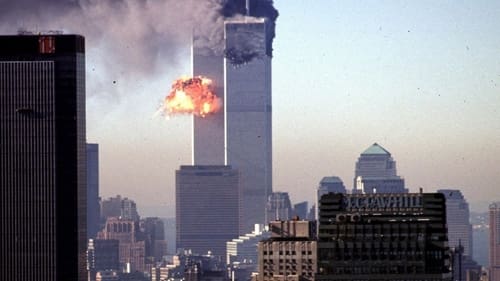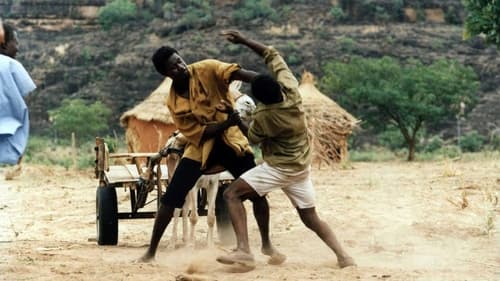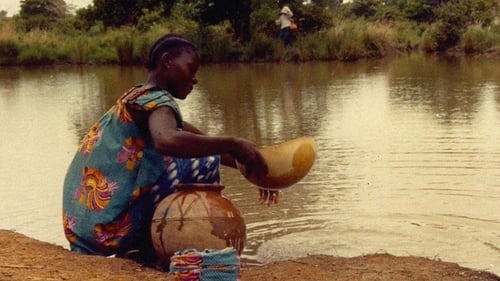
Idrissa Ouedraogo
Nascimento : 1954-01-21, Banfora, Upper Volta [now Burkina Faso]
Morte : 2018-05-01
História
Idrissa Ouédraogo was born in Banfora, Upper Volta (now Burkina Faso), in 1954. He grew up in the town of Ouahigouya in the northern region of his homeland, and in 1976 he was awarded a Bachelor of Arts degree. To ensure a better life his farmer parents sent him to Ouagadougou for further education, where he attended the African Institute for Cinema Studies (Institut Africain d’Etudes Cinématographiques) completing his studies in 1981 with a masters. After studying in Kiev in the USSR he moved to Paris, where he graduated from the Institut des hautes études cinématographiques (IDHEC) in 1985 with a DEA from the Sorbonne. On graduating from IAFEC in 1981, Ouédraogo set up his own independent film company, "The Future of Films", which became "Les Films de la Plaine". In 1981, before moving to Kiev, he worked for the Burkina Faso Directorate of Cinema Production (Direction de la Production Cinématographique du Burkina Faso), where he directed several short films.

Director
The beautiful Awa, from a poor background, decides to marry for money rather than love and ends up with the much older Karim. While married, she continues to love the much younger Bouba. On the happy occasion of Awa’s birthday, a macabre plan is to be set in motion.

Director
20 short films about human rights.

Executive Producer
A dwarf born into an intolerant village meets a farmer who teaches her about love, friendship and sacrifice.

Producer
Patrick, a young Frenchman in his thirties, has been working for a year in a small village in Burkina Faso. He has a relationship for a few months with a 25-year-old village girl, Kaya, who becomes pregnant. When their daughter Martine is born, Patrick flees with her to Europe. The shock of this loss makes Kaya mute. Seven years later, Patrick returns to the village to maintain the boreholes he had built. He arrives with his daughter Martine. The villagers welcome him with reservation. Patrick learns that Kaya has gone silent. Unfortunately, not being able to stay too long in the village, Patrick entrusts Martine to Kaya for a few hours. Discovering her daughter's poor upbringing, Kaya decides to run away into the night with Martine...

Writer
Patrick, a young Frenchman in his thirties, has been working for a year in a small village in Burkina Faso. He has a relationship for a few months with a 25-year-old village girl, Kaya, who becomes pregnant. When their daughter Martine is born, Patrick flees with her to Europe. The shock of this loss makes Kaya mute. Seven years later, Patrick returns to the village to maintain the boreholes he had built. He arrives with his daughter Martine. The villagers welcome him with reservation. Patrick learns that Kaya has gone silent. Unfortunately, not being able to stay too long in the village, Patrick entrusts Martine to Kaya for a few hours. Discovering her daughter's poor upbringing, Kaya decides to run away into the night with Martine...

Self
African filmmaker Idrissa Ouedraogo (YAABA) discusses the influence that Charlie Chaplin has been on his work, along with archival footage of interviews with several of Chaplin's co-stars.

Writer
A king’s son takes over when his father dies.

Director
A king’s son takes over when his father dies.

Writer
Filmmakers from all over the world provide short films – each of which is eleven minutes, nine seconds, and one frame of film in length – that offer differing perspectives on the 9/11 terrorist attacks.

Director
Filmmakers from all over the world provide short films – each of which is eleven minutes, nine seconds, and one frame of film in length – that offer differing perspectives on the 9/11 terrorist attacks.

Writer
Kini and Adams are two friends leaving in a Zimbabwe village who dream of repairing an old broken car, and moving to the city and starting life over.

Director
Kini and Adams are two friends leaving in a Zimbabwe village who dream of repairing an old broken car, and moving to the city and starting life over.

Himself
Within the framework of the “Half a Century of Locarno, Thoughts on the Future” project, seven directors, Idrissa Ouedraogo among them, have the chance to express their vision of the future of the film industry by means of a short film. “The state of the film industry the world is a vast issue,” says the director from Burkina Faso. “I would rather speak about my films, about African films and their relationship with the world”.

Director
Within the framework of the “Half a Century of Locarno, Thoughts on the Future” project, seven directors, Idrissa Ouedraogo among them, have the chance to express their vision of the future of the film industry by means of a short film. “The state of the film industry the world is a vast issue,” says the director from Burkina Faso. “I would rather speak about my films, about African films and their relationship with the world”.

Producer
The movie shows the rise and fall of a cruel and despotic village chief Guimba, and his son Jangine in a fictional village in the Sahel of Mali.

Director
40 international directors were asked to make a short film using the original Cinematographe invented by the Lumière Brothers, working under conditions similar to those of 1895. There were three rules: (1) The film could be no longer than 52 seconds, (2) no synchronized sound was permitted, and (3) no more than three takes.

Director
Eugene, an idealistic young African farmer and musician, decides to leave his village and family momentarily to try out his luck in the city. He makes new friends there, who accompany him on his musical career. He also meets up with Kassi, a childhood friend who has become a prostitute, with whom a new, closer friendship begins. However, when she dies from AIDS, Eugene is confronted by the harsh reality that his spontaneity and innocence blocked out and decides to put his singing talents and fame as a singer to the service of fighting the disease of AIDS. Once back home in his village, the reunion with his wife and children make him realize that life and hope are more powerful than anything else.

Writer
This drama focuses upon the psychological adjustment problems of a young boy whose family moves him from Africa to Paris, France. Moctar, a boy whose first 11 years were spent in a small village in Mali, is having difficulty adjusting to his new life in Paris. After several years in Paris, Moctar suddenly sees a terrible hyena in the street. When Moctar tries to explain his vision, he becomes the laughingstock of his peers and a patient for the school psychologist. No one believes Moctar, not even his parents, until he is befriended by Paulo who helps Moctar understand.

Director
This drama focuses upon the psychological adjustment problems of a young boy whose family moves him from Africa to Paris, France. Moctar, a boy whose first 11 years were spent in a small village in Mali, is having difficulty adjusting to his new life in Paris. After several years in Paris, Moctar suddenly sees a terrible hyena in the street. When Moctar tries to explain his vision, he becomes the laughingstock of his peers and a patient for the school psychologist. No one believes Moctar, not even his parents, until he is befriended by Paulo who helps Moctar understand.

Writer
Samba foge para sua aldeia, depois de um assalto a um posto de gasolina. O amigo morre num tiroteio. Samba escapa com o dinheiro, mas perde a paz. Ele conhece Saratou. Os dois passam a viver juntos, dando apoio um ao outro, na tentativa de esquecer o passado. Saratou tem um filho de dez anos, Ali, de um homem a quem abandonou. Salif, um amigo de infância, e sua mulher Binta, testemunham o ato de desespero de Samba de se livrar de seus pecados.

Producer
Samba foge para sua aldeia, depois de um assalto a um posto de gasolina. O amigo morre num tiroteio. Samba escapa com o dinheiro, mas perde a paz. Ele conhece Saratou. Os dois passam a viver juntos, dando apoio um ao outro, na tentativa de esquecer o passado. Saratou tem um filho de dez anos, Ali, de um homem a quem abandonou. Salif, um amigo de infância, e sua mulher Binta, testemunham o ato de desespero de Samba de se livrar de seus pecados.

Director
Samba foge para sua aldeia, depois de um assalto a um posto de gasolina. O amigo morre num tiroteio. Samba escapa com o dinheiro, mas perde a paz. Ele conhece Saratou. Os dois passam a viver juntos, dando apoio um ao outro, na tentativa de esquecer o passado. Saratou tem um filho de dez anos, Ali, de um homem a quem abandonou. Salif, um amigo de infância, e sua mulher Binta, testemunham o ato de desespero de Samba de se livrar de seus pecados.

Director
Karim's father is missing and presumed dead, which is why his father's brother has taken over the house and is now his stepfather: this is the custom in Burkina Faso. This would be all right with Karim, except that his new stepfather is a harsh, unloving man, who would just as soon beat him as look at him, and he is the same way with the lad's mother. At the same time, Karim has made friends with Sala, a girl from a wealthy family, starting from when he gave her a baby goat-kid. Their friendship prospers enough so that, when Karim and his mother leave the abusive uncle carrying only what they are wearing on their backs, Sala is able to persuade her family to help them settle safely elsewhere. When Karim's father turns up at last, it is icing on the cake, for they are now able to send the obnoxious man who overshadowed their lives away in disgrace.

Director
Directed by Idrissa Ouedraogo.

Producer
Saga returns to his village after an extended absence to discover that his father has taken Nogma, Saga's promised bride, for himself. Still in love with each other, the two begin an affair, although it would be considered incestuous.

Screenplay
Saga returns to his village after an extended absence to discover that his father has taken Nogma, Saga's promised bride, for himself. Still in love with each other, the two begin an affair, although it would be considered incestuous.

Director
Saga returns to his village after an extended absence to discover that his father has taken Nogma, Saga's promised bride, for himself. Still in love with each other, the two begin an affair, although it would be considered incestuous.

Producer
A small African village. The story focuses on Bila, a ten year old boy who befriends an old woman, Sana. Everybody calls her 'Witch' but Bila himself calls her 'Yaaba' (grandmother). When Bila's cousin Nopoko gets sick it is Sana's medicine that saves her.

Screenplay
A small African village. The story focuses on Bila, a ten year old boy who befriends an old woman, Sana. Everybody calls her 'Witch' but Bila himself calls her 'Yaaba' (grandmother). When Bila's cousin Nopoko gets sick it is Sana's medicine that saves her.

Director
A small African village. The story focuses on Bila, a ten year old boy who befriends an old woman, Sana. Everybody calls her 'Witch' but Bila himself calls her 'Yaaba' (grandmother). When Bila's cousin Nopoko gets sick it is Sana's medicine that saves her.

Himself
Djibril Diop Mambéty followed and filmed the shooting of Yaaba, Idrissa Ouédraogo's second feature film. A documentary full of humorous anecdotes regarding the dangers of shooting in Burkina Faso.

Writer
Poverty and misery are rife in Gourga, a village in the Sahel. The inhabitants must choose: stay and await international assistance or leave for more fertile regions in the country.

Director
Poverty and misery are rife in Gourga, a village in the Sahel. The inhabitants must choose: stay and await international assistance or leave for more fertile regions in the country.

Director
Issa is a traditional weaver in Burkina Faso who loves his trade. However, so as not to lose his clientele and continue making enough to keep his wife, Issa finds himself forced to sell Western clothes.

Director
Short directed by Idrissa Ouedraogo.

Director
Short directed by Idrissa Ouedraogo.

Director







